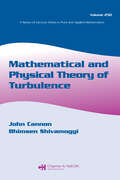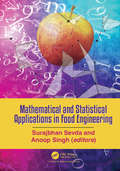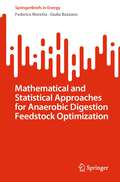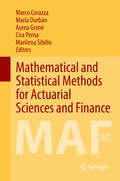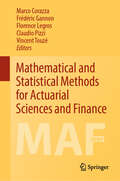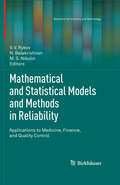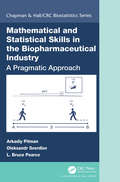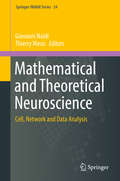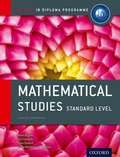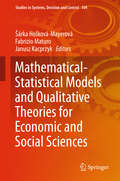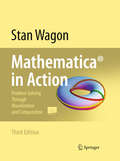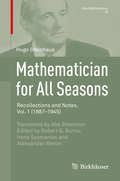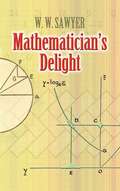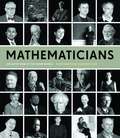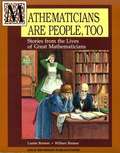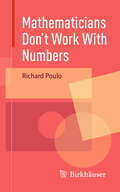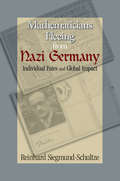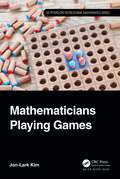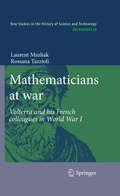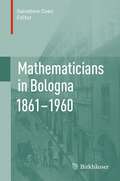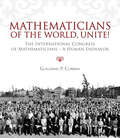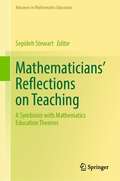- Table View
- List View
Mathematical and Physical Theory of Turbulence, Volume 250 (Lecture Notes in Pure and Applied Mathematics)
by John Cannon Bhimsen ShivamoggiAlthough the current dynamical system approach offers several important insights into the turbulence problem, issues still remain that present challenges to conventional methodologies and concepts. These challenges call for the advancement and application of new physical concepts, mathematical modeling, and analysis techniques. Bringing together ex
Mathematical and Statistical Applications in Food Engineering
by Anoop Singh Surajbhan SevdaWritten by experts from all over the world, the book comprises the latest applications of mathematical and models in food engineering and fermentation. It provides the fundamentals on statistical methods to solve standard problems associated with food engineering and fermentation technology. Combining theory with a practical, hands-on approach, this book covers key aspects of food engineering. Presenting cuttingedge information, the book is an essential reference on the fundamental concepts associated with food engineering.
Mathematical and Statistical Approaches for Anaerobic Digestion Feedstock Optimization (SpringerBriefs in Energy)
by Federico Moretta Giulia BozzanoThis book examines biomass mixture modeling and optimization. The book discusses anaerobic digestion and related fermentative processes and explains their compositional dynamics. Early chapter examine macromolecules, elemental fractions, and their direct influence on methane production. Supported by an extensive data bank of substrates obtained from research, the book points out correlations that enable the estimation of global methane production for diverse biomass mixtures. Furthermore, it provides valuable insights into discerning the optimal composition capable of yielding the utmost methane output.The book integrates cutting-edge machine learning techniques and shows how the programming language Python and Julia can be used for analysis and to optimize processes. It has many graphs, figures, and visuals.
Mathematical and Statistical Methods for Actuarial Sciences and Finance: MAF 2018
by Cira Perna Marilena Sibillo Marco Corazza María Durbán Aurea GranéThe interaction between mathematicians, statisticians and econometricians working in actuarial sciences and finance is producing numerous meaningful scientific results. This volume introduces new ideas, in the form of four-page papers, presented at the international conference Mathematical and Statistical Methods for Actuarial Sciences and Finance (MAF), held at Universidad Carlos III de Madrid (Spain), 4th-6th April 2018. The book covers a wide variety of subjects in actuarial science and financial fields, all discussed in the context of the cooperation between the three quantitative approaches. The topics include: actuarial models; analysis of high frequency financial data; behavioural finance; carbon and green finance; credit risk methods and models; dynamic optimization in finance; financial econometrics; forecasting of dynamical actuarial and financial phenomena; fund performance evaluation; insurance portfolio risk analysis; interest rate models; longevity risk; machine learning and soft-computing in finance; management in insurance business; models and methods for financial time series analysis, models for financial derivatives; multivariate techniques for financial markets analysis; optimization in insurance; pricing; probability in actuarial sciences, insurance and finance; real world finance; risk management; solvency analysis; sovereign risk; static and dynamic portfolio selection and management; trading systems. This book is a valuable resource for academics, PhD students, practitioners, professionals and researchers, and is also of interest to other readers with quantitative background knowledge.
Mathematical and Statistical Methods for Actuarial Sciences and Finance: MAF2024
by Claudio Pizzi Marco Corazza Florence Legros Frédéric Gannon Vincent TouzéThe book presents a collection of peer-reviewed short papers selected from those presented at the International Conference Mathematical and Statistical Methods for Actuarial Sciences and Finance – MAF2024. The year 2024 marks the twentieth anniversary of the first edition of this conference. The idea behind this book is that collaboration and cross-pollination between mathematicians and statisticians working in actuarial sciences and finance could enhance research in these fields. The effectiveness of this concept has been demonstrated by widespread participation across all editions, held at various locations including the University of Salerno, Italy (2004, 2006, 2010, 2014, and 2022); Ca' Foscari University of Venice, Italy (2008, 2012, and 2020); University Paris-Dauphine in Paris, France (2016); University Carlos III of Madrid, Madrid (2018); and University of Le Havre Normandie, Le Havre, France (2024). This effectiveness is also evident in the attention consistently shown by both the scientific community and professionals toward the volumes of peer-reviewed papers accompanying all past editions of MAF. The book is a valuable resource for academics, researchers, Ph.D. students, and professionals. Furthermore, it is also of interest to other readers with a quantitative background.
Mathematical and Statistical Models and Methods in Reliability
by N. Balakrishnan M. S. Nikulin V. V. RykovThe book is a selection of invited chapters, all of which deal with various aspects of mathematical and statistical models and methods in reliability. Written by renowned experts in the field of reliability, the contributions cover a wide range of applications, reflecting recent developments in areas such as survival analysis, aging, lifetime data analysis, artificial intelligence, medicine, carcinogenesis studies, nuclear power, financial modeling, aircraft engineering, quality control, and transportation. Mathematical and Statistical Models and Methods in Reliability is an excellent reference text for researchers and practitioners in applied probability and statistics, industrial statistics, engineering, medicine, finance, transportation, the oil and gas industry, and artificial intelligence.
Mathematical and Statistical Skills in the Biopharmaceutical Industry: A Pragmatic Approach (Chapman & Hall/CRC Biostatistics Series)
by Arkadiy PitmanMathematical and Statistical Skills in the Biopharmaceutical Industry: A Pragmatic Approach describes a philosophy of efficient problem solving showcased using examples pertinent to the biostatistics function in clinical drug development. It was written to share a quintessence of the authors’ experiences acquired during many years of relevant work in the biopharmaceutical industry. The book will be useful will be useful for biopharmaceutical industry statisticians at different seniority levels and for graduate students who consider a biostatistics-related career in this industry. Features: Describes a system of principles for pragmatic problem solving in clinical drug development. Discusses differences in the work of a biostatistician in small pharma and big pharma. Explains the importance/relevance of statistical programming and data management for biostatistics and necessity for integration on various levels. Describes some useful statistical background that can be capitalized upon in the drug development enterprise. Explains some hot topics and current trends in biostatistics in simple, non-technical terms. Discusses incompleteness of any system of standard operating procedures, rules and regulations. Provides a classification of scoring systems and proposes a novel approach for evaluation of the safety outcome for a completed randomized clinical trial. Presents applications of the problem solving philosophy in a highly problematic transfusion field where many investigational compounds have failed. Discusses realistic planning of open-ended projects.
Mathematical and Theoretical Neuroscience: Cell, Network And Data Analysis (Springer INdAM #24)
by Giovanni Naldi Thierry NieusThis volume gathers contributions from theoretical, experimental and computational researchers who are working on various topics in theoretical/computational/mathematical neuroscience. The focus is on mathematical modeling, analytical and numerical topics, and statistical analysis in neuroscience with applications. The following subjects are considered: mathematical modelling in Neuroscience, analytical and numerical topics; statistical analysis in Neuroscience; Neural Networks; Theoretical Neuroscience. The book is addressed to researchers involved in mathematical models applied to neuroscience.
Mathematical studies Standard Level: Course Companion (Oxford IB Diploma Programme)
by Jane Forrest Peter Blythe Jim Fensom Paula Waldman de TokmanNumber and algebra 1, Descriptive statistics, Geometry and trigonometry 1, Mathematical models, Statistical applications, Introducing differential calculus, Number and algebra 2, Sets and probability, Logic, Geometry and trigonometry 2, Project, Getting the most out of your GDC, Prior learning.
Mathematical-Statistical Models and Qualitative Theories for Economic and Social Sciences
by Janusz Kacprzyk Šárka Hošková-Mayerová Fabrizio MaturoThis book presents a broad spectrum of problems related to statistics, mathematics, teaching, social science, and economics as well as a range of tools and techniques that can be used to solve these problems. It is the result of a scientific collaboration between experts in the field of economic and social systems from the University of Defence in Brno (Czech Republic), G. d'Annunzio University of Chieti-Pescara (Italy), Pablo de Olavid eUniversity of Sevilla (Spain), and Ovidius University in Constanţa, (Romania). The studies included were selected using a peer-review process and reflect heterogeneity and complexity of economic and social phenomena. They and present interesting empirical research from around the globe and from several research fields, such as statistics, decision making, mathematics, complexity, psychology, sociology and economics. The volume is divided into two parts. The first part, "Recent trends in mathematical and statistical models for economic and social sciences", collects papers on quantitative matters, which propose mathematical and statistical models for social sciences, economics, finance, and business administration. The second part, "Recent trends in qualitative theories for economic and social sciences", includes papers on qualitative matters, which discuss social, economic, and teaching issues. It is an ideal reference work for all those researchers interested in recent quantitative and qualitative tools. Covering a wide range of topics, it appeals in equal measure to mathematicians, statisticians, sociologists, philosophers, and specialists in the fields of communication, social and political sciences.
Mathematica® in Action
by Stan WagonPlenty of examples and case studies utilize Mathematica 7's newest tools, such as dynamic manipulations and adaptive three-dimensional plotting. Emphasizes the breadth of Mathematica and the impressive results of combining techniques from different areas. Whenever possible, the book shows how Mathematica can be used to discover new things. Striking examples include the design of a road on which a square wheel bike can ride, the design of a drill that can drill square holes, and new and surprising formulas for p. Visualization is emphasized throughout, with finely crafted graphics in each chapter.
Mathematician for All Seasons
by Hugo SteinhausRobert G. Burns Irena Szymaniec Aleksander WeronThis book presents, in his own words, the life of Hugo Steinhaus (1887-1972), noted Polish mathematician of Jewish background, educator, and mathematical popularizer. A student of Hilbert, a pioneer of the foundations of probability and game theory, and a contributor to the development of functional analysis, he was one of those instrumental to the extraordinary flowering of Polish mathematics before and after World War I. In particular, it was he who "discovered" the great Stefan Banach. Exhibiting his great integrity and wit, Steinhaus's personal story of the turbulent times he survived - including two world wars and life postwar under the Soviet heel - cannot but be of consuming interest. His recounting of the fearful years spent evading Nazi terror is especially moving. The steadfast honesty and natural dignity he maintained while pursuing a life of demanding scientific and intellectual enquiry in the face of encroaching calamity and chaos show him to be truly a mathematician for all seasons. The present work will be of great interest not only to mathematicians wanting to learn some of the details of the mathematical blossoming that occurred in Poland in the first half of the 20th century, but also to anyone wishing to read a first-hand account of the history of those unquiet times in Europe - and indeed world-wide - by someone of uncommon intelligence and forthrightness situated near an eye of the storm.
Mathematician's Delight
by W. W. Sawyer"Recommended with confidence" by The Times Literary Supplement, this lively survey starts with simple arithmetic and algebra and proceeds by gradual steps through graphs, logarithms, and trigonometry to calculus and the world of numbers. Generations of readers have found it the ideal introduction to mathematics, offering accessible explanations of how theory arises from real-life applications."The main object of this book is to dispel the fear of mathematics," declares author W. W. Sawyer, adding that "Many people regard mathematicians as a race apart, possessed of almost supernatural powers. While this is very flattering for successful mathematicians, it is very bad for those who, for one reason or another, are attempting to learn the subject." Now retired, Sawyer won international renown for his innovative teaching methods, which he used at colleges in England and Scotland as well as Africa, New Zealand, and North America. His insights into the pleasures and practicalities of mathematics will appeal to readers of all backgrounds.
Mathematicians
by Robert C. Gunning Mariana CookMathematicians is a remarkable collection of ninety-two photographic portraits, featuring some of the most amazing mathematicians of our time. Acclaimed photographer Mariana Cook captures the exuberant and colorful personalities of these brilliant thinkers and the superb images are accompanied by brief autobiographical texts written by each mathematician. Together, the photographs and words illuminate a diverse group of men and women dedicated to the absorbing pursuit of mathematics. The compelling black-and-white portraits introduce readers to mathematicians who are young and old, fathers and daughters, and husbands and wives. They include Fields Medal winners, those at the beginning of major careers, and those who are long-established celebrities in the discipline. Their candid personal essays reveal unique and wide-ranging thoughts, opinions, and humor, as the mathematicians discuss how they became interested in mathematics, why they love the subject, how they remain motivated in the face of mathematical challenges, and how their greatest contributions have paved new directions for future generations. Mathematicians in the book include David Blackwell, Henri Cartan, John Conway, Pierre Deligne, Timothy Gowers, Frances Kirwan, Peter Lax, William Massey, John Milnor, Cathleen Morawetz, John Nash, Karen Uhlenbeck, and many others. Conveying the beauty and joy of mathematics to those both within and outside the field, this photographic collection is an inspirational tribute to mathematicians everywhere.
Mathematicians Are People, Too: Stories From The Lives Of Great Mathematicians (Volume One)
by Luetta Reimer Wilbert ReimerVolume One focuses on moments of mathematical discovery experienced by Thales, Pythagoras, Hypatia, Galileo, Pascal, and others.
Mathematicians Don't Work With Numbers
by Richard PouloThis book answers, in the form of short and entertaining vignettes, the question: "What do mathematicians really do?" Readers will learn that mathematicians use numbers in the same way that novelists use letters. The individual letters are typed while the author thinks on a much grander scale, invisible to the observer. Requiring only familiarity with the multiplication table (and that for only one vignette), the book makes accessible a variety of mathematical concepts, such as game theory, chaos, and traffic flow modelling. The author accomplishes this with a light, engaging style, and a range of real-world examples that includes everything from barbershops to President James Garfield. Mathematicians Don't Work With Numbers will be of interest to the large audience of people who have always assumed that mathematicians do, in fact, work with numbers.
Mathematicians Fleeing from Nazi Germany: Individual Fates and Global Impact
by Reinhard Siegmund-SchultzeThe emigration of mathematicians from Europe during the Nazi era signaled an irrevocable and important historical shift for the international mathematics world. Mathematicians Fleeing from Nazi Germany is the first thoroughly documented account of this exodus. In this greatly expanded translation of the 1998 German edition, Reinhard Siegmund-Schultze describes the flight of more than 140 mathematicians, their reasons for leaving, the political and economic issues involved, the reception of these emigrants by various countries, and the emigrants' continuing contributions to mathematics. The influx of these brilliant thinkers to other nations profoundly reconfigured the mathematics world and vaulted the United States into a new leadership role in mathematics research. Based on archival sources that have never been examined before, the book discusses the preeminent emigrant mathematicians of the period, including Emmy Noether, John von Neumann, Hermann Weyl, and many others. The author explores the mechanisms of the expulsion of mathematicians from Germany, the emigrants' acculturation to their new host countries, and the fates of those mathematicians forced to stay behind. The book reveals the alienation and solidarity of the emigrants, and investigates the global development of mathematics as a consequence of their radical migration. An in-depth yet accessible look at mathematics both as a scientific enterprise and human endeavor, Mathematicians Fleeing from Nazi Germany provides a vivid picture of a critical chapter in the history of international science.
Mathematicians Playing Games (AK Peters/CRC Recreational Mathematics Series)
by Jon-Lark KimMathematicians Playing Games explores a wide variety of popular mathematical games, including their historical beginnings and the mathematical theories that underpin them. Its academic level is suitable for high school students and higher, but people of any age or level will find something to entertain them, and something new to learn. It would be a fantastic resource for high school mathematics classrooms or undergraduate mathematics for liberal arts course and belongs on the shelf of anyone with an interest in recreational mathematics. Features Suitable for anyone with an interest in games and mathematics, and could be especially useful to middle and high school students and their teachers Includes various exercises for fun for readers
Mathematicians at war
by Laurent Mazliak Rossana TazzioliNumerous scientists have taken part in the war effort during World War I, but few gave it the passionate energy of the prominent Italian mathematician Volterra. As a convinced supporter of the cause of Britain and France, he struggled vigorously to carry Italy into the war in May 1915 and then developed a frenetic activity to support the war effort, going himself to the front, even though he was 55. This activity found an adequate echo with his French colleagues Borel, Hadamard and Picard. The huge correspondence they exchanged during the war, gives an extraordinary view of these activities, and raises numerous fundamental questions about the role of a scientist, and particularly a mathematician during WW I. It also offers a vivid documentation about the intellectual life of the time ; Volterra's and Borel's circles in particular were extremely wide and the range of their interests was not limited to their field of specialization. The book proposes the complete transcription of the aforementioned correspondence, annotated with numerous footnotes to give details on the contents. It also offers a general historical introduction to the context of the letters and several complements on themes related to the academic exchanges between France and Italy during the war.
Mathematicians in Bologna 1861–1960
by Salvatore CoenThe scientific personalities of Luigi Cremona, Eugenio Beltrami, Salvatore Pincherle, Federigo Enriques, Beppo Levi, Giuseppe Vitali, Beniamino Segre and of several other mathematicians who worked in Bologna in the century 1861-1960 are examined by different authors, in some cases providing different view points. Most contributions in the volume are historical; they are reproductions of original documents or studies on an original work and its impact on later research. The achievements of other mathematicians are investigated for their present-day importance.
Mathematicians of the World, Unite!: The International Congress of Mathematicians--A Human Endeavor
by Guillermo CurberaThis vividly illustrated history of the International Congress of Mathematicians- a meeting of mathematicians from around the world held roughly every four years- acts as a visual history of the 25 congresses held between 1897 and 2006, as well as a story of changes in the culture of mathematics over the past century. Because the congress is an int
Mathematicians' Reflections on Teaching: A Symbiosis with Mathematics Education Theories (Advances in Mathematics Education)
by Sepideh StewartThis book opens the case on collaboration among mathematicians and mathematics educators. The authors of this book provide their research and experience based insights on collaboration to inspire the young generation of the mathematics community to engage in productive collaborations and exchange of knowledge early in their careers. These valuable collaborations are anticipated to generate innovative research questions that set new and novel paths for mathematics education research with ample possibilities yet to be realized and discovered.
Mathematics
by David J. Chard Earlene J. Hall Edward B. Burger Jennie M. Bennett Paul A. Kennedy Freddie L. Renfro Tom W. Roby Janet K. Scheer Bert K. WaitsThe topics described in the Standards for Mathematical Content will vary from year to year. However, the way in which you learn, study, and think about mathematics will not. The Standards for Mathematical Practice describe skills that you will use in all of your math courses.
